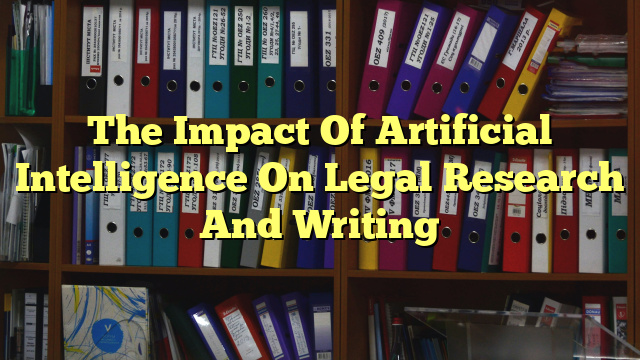Table of Contents
- What is Artificial Intelligence?
- How is AI Used in the Legal Field?
- What are the Benefits of AI in Legal?
- Can AI Write a Legal Brief?
- Legal Research Tools
What is Artificial Intelligence?
Artificial Intelligence (AI) is the term used to describe a machine’s ability to think and learn like a human. AI is a form of technology that attempts to simulate human intelligence, often by using algorithms to identify patterns in data. AI has the potential to automate certain tasks and processes, as well as generate insights from large data sets. AI has been used in many areas of research, from business to healthcare, and is now making its way into the legal profession.
How is AI Used in the Legal Field?
AI is used in the legal field primarily for legal research. Legal research involves gathering legal information from various sources, such as cases or statutes, and then synthesizing that data for a client or case. AI can help streamline this process by automating certain tasks, such as searching for relevant case law or statutes, and summarizing the findings. Legal research can be extremely time-consuming, but AI can help lawyers save time and effort by doing the research for them.
In addition to legal research, AI can be used to detect potential conflicts of interest, identify the risk of legal malpractice, and help lawyers draft documents more quickly and accurately. AI can also help lawyers make better decisions by identifying key facts and points of law that may not have been considered otherwise.
What are the Benefits of AI in Legal?
The primary benefit of AI in legal is its ability to streamline tedious tasks and processes. AI can be used to automate certain tasks, such as legal research, that would normally take a significant amount of time and effort. This can help lawyers save time and money, as well as ensure accuracy in their legal work.
In addition, AI can help lawyers make more informed decisions by providing them with accurate and up-to-date information. AI can also help lawyers anticipate potential risks and identify potential conflicts of interest. Finally, AI can help lawyers draft documents more quickly and accurately, with fewer errors.
Can AI Write a Legal Brief?
At this time, AI is not able to write a legal brief on its own. However, AI can be used to help lawyers draft documents more quickly and accurately. AI can be used to scan documents for relevant information, summarize key points of law, and provide suggested edits. AI can also be used to flag potential errors or conflicts of interest.
Legal Research Tools
AI can also be used to develop legal research tools. These tools can help lawyers search for relevant case law, statutes, and other legal documents quickly and accurately. Additionally, AI-powered legal research tools can generate insights from large data sets and perform document analysis. This can help lawyers draft documents more quickly and accurately, and make better decisions.
In conclusion, AI is quickly becoming a valuable tool in the legal field. AI can help lawyers streamline tedious tasks, make better decisions, and draft documents more quickly and accurately. AI can also be used to develop legal research tools and flag potential errors or conflicts of interest. As AI continues to evolve, its impact on the legal field will only increase.


Absolutely, AI is transforming the legal world. It’s greatly reducing the need for manual labor with its powerful algorithms. And yet I’d point to AI’s potential to do even more: perhaps AI can be used to personalize legal services for clients.